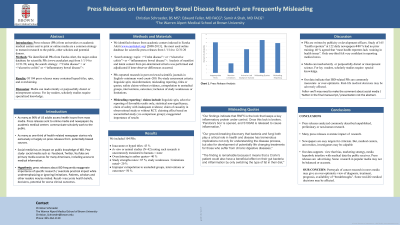Back

Poster Session D - Tuesday Morning
Category: IBD
D0395 - Press Releases of Inflammatory Bowel Disease Research Are Frequently Misleading
Tuesday, October 25, 2022
10:00 AM – 12:00 PM ET
Location: Crown Ballroom


Christian Schroeder, BS, MS
Warren Alpert Medical School at Brown University
Providence, RI
Presenting Author(s)
Christian Schroeder, BS, MS1, Edward Feller, MD, FACG2, Samir A. Shah, MD, FACG3
1Warren Alpert Medical School at Brown University, Providence, RI; 2Warren Alpert Medical School of Brown University, Providence, RI; 3Warren Alpert Medical School / The Miriam Hospital, Providence, RI
Introduction: Press releases (PRs) from universities or academic medical centers sent to print or online media are a
common strategy to transmit research to the public, other scholars and potential donors.
At times, the goal may be publicity at the expense of accuracy. Data indicate that as many as one-third
of medical news stories rely exclusively or largely on PRs from potentially prejudiced sources. At best,
some PRs are over-hyped and, at worst, misleading.
PRs describing inflammatory bowel disease (IBD) research can exaggerate the impact of
specific studies, omit vital facts and overstate or misrepresent strengths while downplaying or ignoring
limitations or harms.
Methods: We identified all PRs from Eureka Alert, the major online database for scientific PRs
(www.eurekalert.org) from 1/1/14 to 12/31/20, using the search strategy: <”Crohn disease” > or
<“ulcerative colitis” or <“inflammatory bowel disease”>. PRs reported research in peer-reviewed
scientific journals in English minimum word count of 200. Pre-study, assessment criteria were
established, including: definitions of linguistic spin; misinformation; misleading reporting, titles or
quotes; claims of safety without evidence; extrapolation to unstudied groups, interventions or
outcomes; and if a PR discussed study weaknesses/limitations. Inter-author disagreements were
adjudicated to achieve consensus.
Results: We included 104 PRs: 43% had inaccurate or hyped titles; none of the 42 in vitro or animal
studies noted the infrequency that such research is translated to human clinical use. Overclaiming in
author quotes occurred in 40 %. Study strengths were noted in 87%, but study limitations/weaknesses
were infrequent (20%). Half of the PRs had improper extrapolation to unstudied groups, interventions
or outcomes.
Discussion: Typically, PRs are written by publicity or development officers. A study of 165 “health reporters” at
122 daily newspapers revealed that 80 % had no prior training; 40 % agreed that, “most health
reporters lack training in health issues”. Only one-third felt very confident in reporting medical news.
Media can inadvertently or purposefully distort or misrepresent science. For lay readers, scholarly
studies require specialized knowledge. Our data indicate that IBD-related PRs are commonly
inaccurate or over-optimistic. Real-life medical decisions may be adversely affected by inaccurate
PRs.
Disclosures:
Christian Schroeder, BS, MS1, Edward Feller, MD, FACG2, Samir A. Shah, MD, FACG3. D0395 - Press Releases of Inflammatory Bowel Disease Research Are Frequently Misleading, ACG 2022 Annual Scientific Meeting Abstracts. Charlotte, NC: American College of Gastroenterology.
1Warren Alpert Medical School at Brown University, Providence, RI; 2Warren Alpert Medical School of Brown University, Providence, RI; 3Warren Alpert Medical School / The Miriam Hospital, Providence, RI
Introduction: Press releases (PRs) from universities or academic medical centers sent to print or online media are a
common strategy to transmit research to the public, other scholars and potential donors.
At times, the goal may be publicity at the expense of accuracy. Data indicate that as many as one-third
of medical news stories rely exclusively or largely on PRs from potentially prejudiced sources. At best,
some PRs are over-hyped and, at worst, misleading.
PRs describing inflammatory bowel disease (IBD) research can exaggerate the impact of
specific studies, omit vital facts and overstate or misrepresent strengths while downplaying or ignoring
limitations or harms.
Methods: We identified all PRs from Eureka Alert, the major online database for scientific PRs
(www.eurekalert.org) from 1/1/14 to 12/31/20, using the search strategy: <”Crohn disease” > or
<“ulcerative colitis” or <“inflammatory bowel disease”>. PRs reported research in peer-reviewed
scientific journals in English minimum word count of 200. Pre-study, assessment criteria were
established, including: definitions of linguistic spin; misinformation; misleading reporting, titles or
quotes; claims of safety without evidence; extrapolation to unstudied groups, interventions or
outcomes; and if a PR discussed study weaknesses/limitations. Inter-author disagreements were
adjudicated to achieve consensus.
Results: We included 104 PRs: 43% had inaccurate or hyped titles; none of the 42 in vitro or animal
studies noted the infrequency that such research is translated to human clinical use. Overclaiming in
author quotes occurred in 40 %. Study strengths were noted in 87%, but study limitations/weaknesses
were infrequent (20%). Half of the PRs had improper extrapolation to unstudied groups, interventions
or outcomes.
Discussion: Typically, PRs are written by publicity or development officers. A study of 165 “health reporters” at
122 daily newspapers revealed that 80 % had no prior training; 40 % agreed that, “most health
reporters lack training in health issues”. Only one-third felt very confident in reporting medical news.
Media can inadvertently or purposefully distort or misrepresent science. For lay readers, scholarly
studies require specialized knowledge. Our data indicate that IBD-related PRs are commonly
inaccurate or over-optimistic. Real-life medical decisions may be adversely affected by inaccurate
PRs.
Disclosures:
Christian Schroeder indicated no relevant financial relationships.
Edward Feller indicated no relevant financial relationships.
Samir Shah indicated no relevant financial relationships.
Christian Schroeder, BS, MS1, Edward Feller, MD, FACG2, Samir A. Shah, MD, FACG3. D0395 - Press Releases of Inflammatory Bowel Disease Research Are Frequently Misleading, ACG 2022 Annual Scientific Meeting Abstracts. Charlotte, NC: American College of Gastroenterology.
